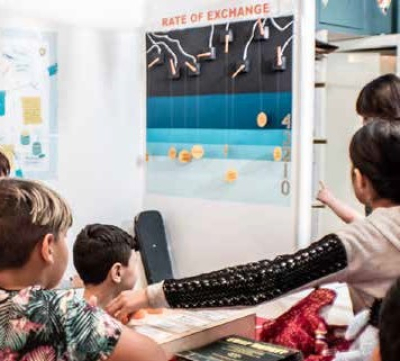Crypto-knitting, Blockchain and Cryptocurrencies

As the world moves towards a cashless society where machines and technology have an ever increasing impact on our lives, the importance of financial education and resource distribution is ever pressing.
Crypto-Knitting-Circles is a year-long project that explores the potentials and challenges of blockchain applications and cryptocurrencies through crafts and design.
Visual artist and Community Economies Institute member Ailie Rutherford and designer Bettina Nissen developed a range of workshops that would make some of the principles of blockchain technology visible and more understandable through the use of craft practices.
They used practices such as knitting and weaving to convey and understand aspects of blockchain, the concept of a shared ledger and a decentralised network, thereby inviting critical thinking and discussion on this technology.
Rutherford and Nissen explain: "We looked at what might be exchanged on a feminist currency network, where might these new technologies be useful? And what are our concerns?"
"Alongside discussions about a how feminist currency networks could be used for activities such as childcare, storytelling, DIY and repair skills, befriending, carework and tech skills, there were also deliberations on deeper questions such as whether we want to invent a system that is scalable."
Rutherford and Nissen ask, "Is a bigger network always less democratic? Could we have a small network that still allows global connections? What aspects of 'globalisation' do we want to keep?"
The Crypto-Knitting-Circles workshops resulted in a set of common values and shared aims drafted by participants; these and other aspects of the workshops are detailed in the Crypto-Knitting-Circles publication (which has also been translated into Spanish by Matías Miguel Burin Heras).
In collaboration with Libby Odai, Rutherford and Nissen produced a prototype of a technological apparatus that allows for the collective negotiation of exchange rates and value systems, fostering conversations about alternative economic exchange models.
They also held a Chain Re: Action knowledge exchange at Platform Glasgow during which academics, community-based projects, feminist groups and local activists who were working in blockchain applications and technology for social good gathered to discuss the political potentials and challenges of cryptocurrencies.
The project was supported by Creative Scotland, South East Vibrancy Fund, and Edinburgh College of Arts; and Rutherford and Nissen have now received funding for a follow-up String Figures project, which aims to design and build a trans-local decentralised system of exchange and mutual support across activist groups in the Govanhill area that are working for social and economic justice.
This new project will collaborate with creative technologist Bob Moyler to devise a digital version of Rutherford's mapping processes for remote collaboration and exchange (which feature in the slideshow here).
Along with these projects, Rutherford continues her work with The People's Bank of Govanhill and the associated Swap Market which puts feminist economics into practice through the transformation of a former pawn shop into a space for swapping and sharing resources without the need for money.
As part of this work, Rutherford has drawn on the iceberg metaphor to 'map' the local economy, including interactive performance work in a cardboard Iceberg costume in unlikely venues such as chip shops and kebab houses to instigate conversations about economic diversity.
Christina Jerne
